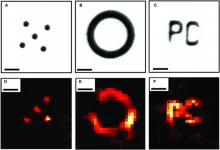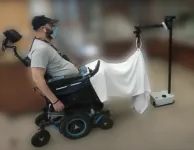(Press-News.org) Media contacts:
Robin Marks, 628-399-0370
Robin.Marks@ucsf.edu | @UCSF
Julie Langelier, 415-734-5000
julie.langelier@gladstone.org | @GladstoneInst
New Data Show Therapies May Activate Lymph Nodes to Produce Tumor-Tackling T Cells
Cancer treatment routinely involves taking out lymph nodes near the tumor in case they contain metastatic cancer cells. But new findings from a clinical trial by researchers at UC San Francisco and Gladstone Institutes shows that immunotherapy can activate tumor-fighting T cells in nearby lymph nodes.
The study, published March 16, 2023 in Cell, suggests that leaving lymph nodes intact until after immunotherapy could boost efficacy against solid tumors, only a small fraction of which currently respond to these newer types of treatments.
Most immunotherapies are aimed only at reinvigorating T cells in the tumor, where they often become exhausted battling the tumor’s cancer cells. But the new research shows that allowing the treatment to activate the immune response of the lymph nodes as well can play an important role in driving positive response to immunotherapy.
“This work really changes our thinking about the importance of keeping lymph nodes in the body during treatment,” said Matt Spitzer, PhD, an investigator for the Parker Institute for Cancer Immunotherapy and Gladstone-UCSF Institute of Genomic Immunology and senior author of the study.
Lymph nodes are often removed because they are typically the first place metastatic cancer cells appear, and without surgery, it can be difficult to determine whether the nodes contain metastases.
“Immunotherapy is designed to jump start the immune response, but when we take out nearby lymph nodes before treatment, we’re essentially removing the key locations where T cells live and can be activated,” Spitzer said, noting that the evidence supporting the removal of lymph nodes is from older studies that predate the use of today’s immunotherapies.
Aim for the Lymph Nodes, Not the Tumor
Researchers have largely been working under the assumption that cancer immunotherapy works by stimulating the immune cells within the tumor, Spitzer said. But in a 2017 study in mice, Spitzer showed that immunotherapy drugs are actually activating the lymph nodes.
“That study changed our understanding of how these therapies might be working,” said Spitzer. Rather than the immunotherapy pumping up the T cells in the tumor, he said, T cells in the lymph nodes are likely the source for T cells circulating in the blood. Such circulating cells can then go into the tumor and kill off the cancer cells.
Having shown that intact lymph nodes can temper cancer’s hold in mice, Spitzer’s team wanted to know whether the same would prove true in human patients. They chose to design a trial for patients with head and neck cancers because of the high number of lymph nodes in those areas.
The trial enrolled 12 patients whose tumors hadn’t yet metastasized past the lymph nodes. Typically, such patients would undergo surgery to remove the tumor, followed by other treatments if recommended.
Instead, patients received a single cycle of an immunotherapy drug called atezolizumab (anti-PD-L1) that is produced by Genentech, a sponsor of the trial. A week or two later, Spitzer’s team measured how much the treatment activated the patients’ immune systems.
The treatment also included surgically removing each patient’s tumor and nearby lymph nodes after immunotherapy and analyzing how the immunotherapy affected them.
The team found that, after immunotherapy, the cancer-killing T cells in the lymph nodes began springing into action. They also found higher numbers of related immune cells in the patients’ blood.
Spitzer attributes some of the trial’s success to its design, which allowed the team to get a lot of information from a small number of patients by looking at the tissue before and after surgery and running detailed analyses.
“Being able to collect the tissue from surgery shortly after the patients had been given the drug was a really unique opportunity,” he said. “We were able to see, at the cellular level, what the drug was doing to the immune response.”
That kind of insight would be challenging to get from a more traditional trial in patients with later-stage disease, who would not typically benefit from undergoing surgery after immunotherapy.
Metastases Inhibit Immune Response
Another benefit of the study design was that it allowed researchers to compare how the treatment affected lymph nodes with and without metastases, or a second cancer growth.
“No one had looked at metastatic lymph nodes in this way before,” said Spitzer. “We could see that the metastases impaired the immune response relative to what we saw in the healthy lymph nodes.”
It could be that the T cells in these metastatic nodes were less activated by the therapy, Spitzer said. If so, that could explain, in part, the poor performance of some immunotherapy treatments.
Still, the therapy prompted enough T-cell activity in the metastatic lymph nodes to consider leaving them in for a short period of time until treatment ends. “Removing lymph nodes with metastatic cancer cells is probably still important but taking them out before immunotherapy treatment may be throwing the baby out with the bathwater,” said Spitzer.
A subsequent goal of the current trial is to determine whether giving immunotherapy before surgery protects against the recurrence of tumors in the future. Researchers won’t know the answer to that until they’ve had a chance to monitor the participants for several years.
“My hope is that if we can activate a good immune response before the tumor is taken out, all those T cells will stay in the body and recognize cancer cells if they come back,” Spitzer said.
Next, the team plans to study better treatments for patients with metastatic lymph nodes, using drugs that would be more effective at reactivating their immune responses.
Authors: Additional authors on the study include: Maha K. Rahim, Trine Line H. Okholm, Kyle B. Jones, Elizabeth E. McCarthy, Jacqueline L. Yee, Diana M. Marquez, Iliana Tenvooren, Patrick Ha, and Katherine Wai of the Departments of Otolaryngology-Head and Neck Surgery and Microbiology and Immunology and the Helen Diller Family Comprehensive Cancer Center (HDFCCC), Matthew F. Krummel of HDFCCC, the Department of Pathology and the Parker Institute for Cancer Immunotherapy, Lawrence Fong of HDFCCC, the Department of Medicine, and the Parker Institute for Cancer Immunotherapy, Alain P. Algazi of HDFCCC and the Department of Medicine, Alexander Cheung of the Department of Medicine, Alexis J. Combes of UCSF CoLabs, the Department of Medicine, and the Department of Pathology, and Stanley J. Tamaki, Brittany R. Davidson, Vrinda Johri, and Bushra Samad of UCSF CoLabs. For other authors, please see the paper.
Funding: National Institutes of Health grants (DP5 OD023056, R01 DE032033, S10 OD025187, S10 OD018040, and K23DE029239), along with and funding from Roche/Genentech through the immunotherapy Centers of Research Excellence (imCORE). For other funders, please see the paper.
About UCSF: The University of California, San Francisco (UCSF) is exclusively focused on the health sciences and is dedicated to promoting health worldwide through advanced biomedical research, graduate-level education in the life sciences and health professions, and excellence in patient care. UCSF Health, which serves as UCSF's primary academic medical center, includes top-ranked specialty hospitals and other clinical programs, and has affiliations throughout the Bay Area. UCSF School of Medicine also has a regional campus in Fresno. Learn more at https://ucsf.edu, or see our Fact Sheet.
About Gladstone Institutes: Gladstone Institutes is an independent, nonprofit life science research organization that uses visionary science and technology to overcome disease. Established in 1979, it is located in the epicenter of biomedical and technological innovation, in the Mission Bay neighborhood of San Francisco. Gladstone has created a research model that disrupts how science is done, funds big ideas, and attracts the brightest minds.
###
Follow UCSF
ucsf.edu | Facebook.com/ucsf | YouTube.com/ucsf
END
Can lymph nodes boost the success of cancer immunotherapy?
2023-03-20
ELSE PRESS RELEASES FROM THIS DATE:
Emergence of extensively drug-resistant Shigella sonnei strain in France
2023-03-20
Shigellosis, a highly contagious diarrheal disease, is caused by Shigella bacteria circulating in industrializing countries but also in industrialized countries. Scientists from the French National Reference Center for Escherichia coli, Shigella and Salmonella at the Institut Pasteur who have been monitoring Shigella in France for several years have detected the emergence of extensively drug-resistant (XDR) strains of Shigella sonnei. Bacterial genome sequencing and case characteristics (with most cases being reported in male adults) suggest that these strains, which originated in South Asia, mainly spread among men who have sex with men (MSM). This observation needs to ...
Speckle-illumination proves useful in photoacoustic microscopy
2023-03-20
Motivated by the limitations of scanning approaches to photoacoustic microscopy, an international group supervised by Emmanuel Bossy of Université Grenoble Alpes experimented with structured illumination using known and unknown speckle patterns. One of their experiments produced the first demonstration of the use of blind structured illumination for photoacoustic imaging through a diffuser.
The group’s research was published Jan. 11 in Intelligent Computing, a Science Partner Journal.
The research article concludes that “photoacoustic microscopy can harness many of the structured illumination methods developed initially for pure optical ...
Carnegie Mellon researchers develop head-worn device to control mobile manipulators
2023-03-20
More than five million people in the United States live with some form of paralysis and may encounter difficulties completing everyday tasks, like grabbing a glass of water or putting on clothes. New research from Carnegie Mellon University's Robotics Institute (RI) aims to increase autonomy for individuals with such motor impairments by introducing a head-worn device that will help them control a mobile manipulator.
Teleoperated mobile manipulators can aid individuals in completing daily activities, but many existing technologies like hand-operated joysticks or web interfaces require a user to have substantial fine motor skills to effectively ...
Excess calories during development alters the brain and spurs adult overeating
2023-03-20
People whose mothers are overweight during pregnancy and nursing may become obese as adults because early overnutrition rewires developing brains to crave unhealthy food, according to a Rutgers study in Molecular Metabolism.
Rutgers researchers traced this link from mother to child in mice with an experiment that began by letting some mice get obese on unlimited high-fat food during pregnancy and breastfeeding while keeping others slim on limitless healthy food. They found that mice born to obese mothers stay slim in adulthood on unlimited healthy food but overeat more than mice born to lean mothers when given access to unhealthy food.
The ...
Federal-local immigration enforcement policies designed to reduce crime found to raise victimization among Latinos
2023-03-20
Efforts to understand the effects of immigration enforcement on crime have largely been informed by police crime statistics. In a new study, researchers used longitudinal data from the U.S. National Crime Victimization Survey (NCVS) to assess the impact of federal immigration policies on local communities. They found that activation of two policies—the Secure Communities Program and 287(g) task force agreements—significantly increased the risk of violent victimization among Latinos.
The study, by researchers at Penn State University and the University of Maryland (UMD) at College Park, ...
Developing postoperative delirium is associated with a faster rate of cognitive decline
2023-03-20
BOSTON, MA -- Research published today in the JAMA Internal Medicine finds that developing postoperative delirium is associated with a 40% faster rate of cognitive decline over those who do not develop delirium.
“Delirium is associated with faster cognitive decline,” said Zachary J. Kunicki, PhD, MS, MPH Assistant Professor located at the Warren Alpert Medical School of Brown University, the first author. “Whether delirium causes this faster rate of decline, or is simply a marker of those who are at risk of experiencing faster ...
Daily step counts before, after onset of COVID-19
2023-03-20
About The Study: The findings of this study suggest a consistent, widespread, and significant decline in activity following the onset of COVID-19 in the United States. Vulnerable populations, including individuals at a lower socioeconomic status and those reporting worse mental health in the early COVID-19 period, were at the highest risk of reduced activity. The researchers found a significant decline in daily step counts that persisted even after most COVID-19–related restrictions were relaxed, suggesting COVID-19 affected long-term behavioral choices. It is currently unknown whether this reduction is steps is clinically meaningful over time.
Authors: Evan L. ...
Gender disparity in NIH funding among surgeon-scientists
2023-03-20
About The Study: The results of this study of National Institutes of Health (NIH)-funded surgeons suggest that women surgeons remained underrepresented among surgeon-scientists over a 25-year period despite early career success in receiving NIH funding. These findings suggest that substantial additional support for women surgeon-scientists is necessary to achieve a gender-diverse surgical research workforce.
Authors: Mytien Nguyen, M.S., of the Yale School of Medicine in New Haven, Connecticut, is the corresponding author.
To access the embargoed study: Visit our For The Media website at this link https://media.jamanetwork.com/
(doi:10.1001/jamanetworkopen.2023.3630)
Editor’s ...
Patients overwhelmingly prefer immediate access to test results, even when the news may not be good
2023-03-20
BOSTON – In April 2021, new federal rules went into effect mandating that healthcare providers make nearly all test results and clinical notes immediately available to patients. Evidence suggests that patients may gain important clinical benefits by reviewing their medical records, and access through electronic patient portals has been advocated as a strategy for empowering patients to manage their health care and for strengthening patient-clinician relationships. However, concerns remain about the effects of releasing test results to patients before clinicians offer counsel or interpretation.
In ...
PLOS announces newest joiners to the CRL/NERL Agreement
2023-03-20
SAN FRANCISCO – The Public Library of Science (PLOS) welcomes several new participants to its ongoing three-year consortial agreement with Center for Research Libraries (CRL) and the Northeast Research Libraries (NERL) program. Joining twenty fellow member institutions who signed on during the first year, newly participating institutions for the second year include Duke University, Macalester College, University of Arizona, University of Denver, and University of Southern California, University of Texas at Austin, and University of Washington.
This agreement provides researchers with unlimited publishing privileges in PLOS journals without incurring fees. All PLOS journals are underpinned ...


